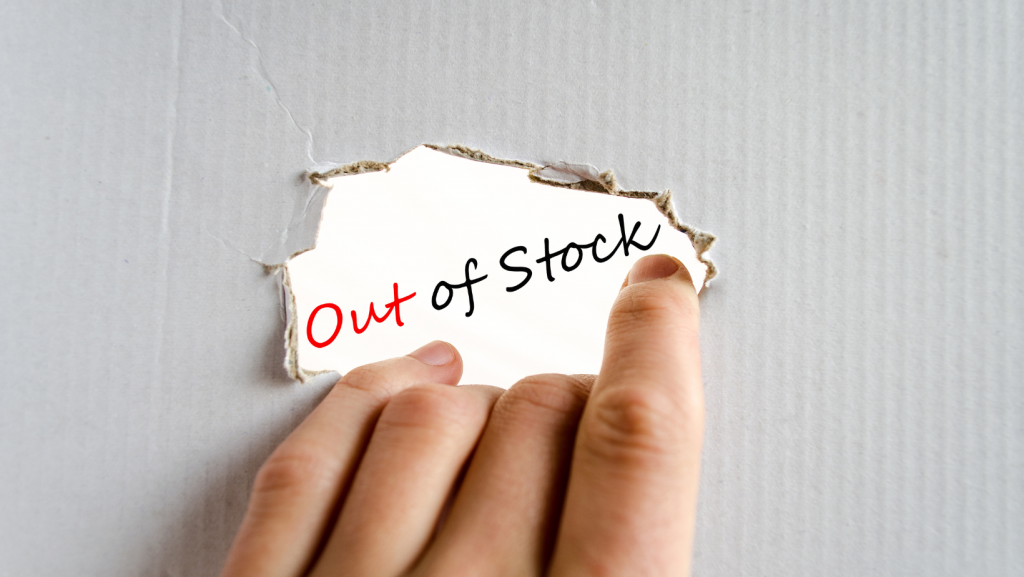Avoid having products out of stock products. Stock-Outs can be a problem for any company that sells physical products and can become a real nightmare with serious and diverse consequences.
When a company’s inventory is out of stock and can’t meet demand, it can have a very negative impact on your customer’s experience.
Stock issues are a sufficiently important threat to any strategic business plan. This is something to take into account and have a plan in place should this event occur.

Knowing the main causes of stock-outs will help you to avoid them.
Although there are a series of fairly common reasons that can trigger stock-outs in a warehouse, it is important to bear in mind that the particularity of each company and/or sector has a direct influence on this type of problem.
Supplier Delays
This is undoubtedly one of the most common causes of stock breakage and is also highly dangerous as it does not depend on your company but on a third party.
In this sense, it is very important to carry out a well-scheduled purchase plan that already has a margin of additional time to avoid this type of problem.
Poor Inventory Control
In some companies, inventory control is not carried out with all the necessary rigour and, as a consequence, it can end up affecting the warehouse.
To avoid stock breakage, one of the best options is to have software that helps you with this process, and data automation that will undoubtedly make it much easier to have your logistics under control.
Poor Sales Forecasting
Not being able to know how much or when your customers will buy is no excuse.
The supply of your warehouse must be done consistently, following a sales plan and a series of commercial forecasts.
Of course, there can always be an uncontrolled increase in demand that has not been planned, but in most cases, this is a bad business projection that must be solved.
Human Error and/or Communication Failures
Human error and miscommunication between departments can also end up triggering an out-of-stock incident, although this may not seem to be a very common cause.
When we talk about human error, we should not think of teams doing their job badly or being demotivated. In many cases, poor training on how the supply chain works can have such consequences.
As for interdepartmental communication, this is a fairly common problem in large companies and/or companies with poorly defined communication which, in most cases, can be avoided by defining the responsibilities of each department and providing them with the appropriate management tools.
Knowing the possible consequences of stock-outs in your warehouse will help you to establish a crisis plan to solve the problem as soon as possible in the event of a stock-out.
Loss of sales
If you don’t have products to meet customer demand, loss of sales will be the first logical consequence.
Also, bear in mind that even in the case of recurring products, losing a sale today due to a lack of stock may result in the loss of a customer.
Poor customer experience
When someone is ready to buy a product, there is nothing worse than informing them that it is not available, especially when it is an unforeseeable stock shortage.
In many cases, and depending on the user’s need, this bad customer experience ends up turning your customers into customers for your competitors!
Reputational problems
The problem starts with a loss of credibility, which can lead to a reputation crisis.
When a customer (especially a loyal customer) trusts your brand to make a purchase, they have come a long way.
For this reason, finding that the product they want is not available can break the trust they have placed in your brand and, depending on the seriousness of the situation, trigger a reputation crisis which, nowadays, with the power of social networks, can lead to many problems.
Additional costs
Aware of the seriousness of the problem of lack of stock, many companies decide to carry out actions such as urgent transport or discounts or gifts to try to reduce customer discomfort.
These decisions, which can be more or less effective depending on each particular case, generate additional costs for the company, which end up reducing profits.
As we have seen throughout this blog, the causes of warehouse stock-outs can be diverse and vary depending on the characteristics of each company.
As a sourcing partner, most of the problems that our clients report to us are related to poor planning of the purchasing process, something that usually happens to companies that are importing for the first time or they assign this task to people with little experience.
After such problems, many businesses choose to seek the help of a specialist purchasing management company, such as S3UK Ltd.
It is important to remember that when importing goods from overseas, one of the main problems that can arise is the delay of goods.
These are long, slow journeys and it is not always possible to meet the initially desired dates.
Nevertheless, possible delays in imported goods are no reason to leave warehouses empty.
In this sense, having a sourcing strategy tailored to our business is essential so that any delay or inconvenience does not lead to a breakage of stock and we have to suffer the consequences.